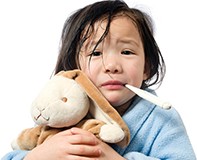Peer Reviewed
Feature Article Infectious diseases
Fever in the returned child traveller
Abstract
Fever is common in children after overseas travel. Although usually a symptom of a nonspecific self-limiting condition, it can signify a serious illness such as malaria, dengue fever, enteric fever, rickettsial disease, tuberculosis, yellow fever or hepatitis. A detailed travel history and examination for specific symptoms and signs can help guide investigations and the decision to refer to hospital.
Key Points
- High or persistent fever can be a marker of serious illness in children who have returned from overseas travel, and requires prompt assessment.
- A detailed history of travel, immunisations, prophylaxis and exposures, and thorough medical examination will help focus investigations.
- First-line investigations include a full blood count, white blood cell differential count, blood and stool cultures, blood films and a rapid antigen test for malaria.
- Respiratory and urinary tract infections are common; consider viral studies of a nasopharyngeal aspirate, chest x-ray and urine dipstick or culture.
- Malaria should be ruled out in anyone presenting with persistent or recurrent fever after travel to a malaria- endemic region in the previous year.
- Other common infections in travellers include dengue fever, typhoid fever and rickettsial infections.
- Children who are systemically unwell with a fever require hospital admission.
Purchase the PDF version of this article
Already a subscriber? Login here.

